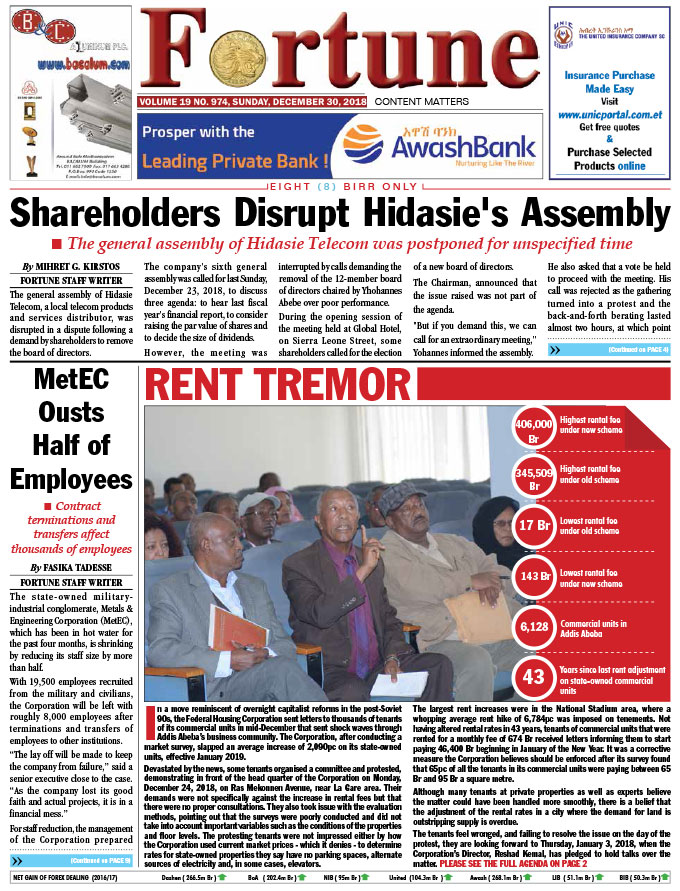
Life Matters | Sep 27,2020
For a young man who was born and raised in the capital and always had the itch for journalism, the media was enticing.
He wanted to be part of the media, because of the power it has in providing the public with the right information and its ability to put governments in check.
Chasing after his passion, he studied journalism at Dilla University and graduated in 2018.
“I graduated when it was an exciting time to join the media,” the young man, who spoke to Fortuneon the condition of anonymity, said. “A lot of changes in the sector were taking place."
A few months ahead of his graduation, Prime Minister Abiy Ahmed (PhD) came to power, and one of the reforms he introduced was the relaxation of control over the media.
The government released bloggers and journalists from jail, while previously blocked websites, blogs and satellite television stations were opened.
Moreover, when Ethiopian Broadcast Authority got four additional board members, one of them was Merera Gudina (PhD), a prominent opposition political leader.
The change in the political sphere was regarded as a heyday for the media by many.
The freeing of the sector, besides enabling political freedom, was expected to help drive the industry, which was criticised for being in chains to reach its true potential.
The reform led to the formation of many media outlets, especially print publications. Within eight months after Prime Minister Abiy came to office, 21 new print publications acquired licenses.
The change was also beneficial for the broadcast media too. TV and radio stations found themselves in an uncharted territory they had not seen before. Entertainment stations suddenly started addressing political issues.
They ran programmes that criticised the government, had opposition and previously exiled leaders as guests on their shows, and even made political jokes that were previously perceived to be off limits.
It was at this time the young man joined the industry with fresh energy, excitement and with the belief that he could make a difference.
He sent his CV to most of the media companies, and luckily he was called by one of the TV stations, LTV Ethiopia.
He was initially hired as a social media curator. But after a couple of months, he was promoted to be a journalist and became part of the team that produced news stories.
There are 31 licensed satellite television stations, 28 radio stations and the previous month saw 25 current publications from the print media that are distributed in more than one region.
The job taught him a lot, and he liked it. But he says all was not well in the institution, and he never gained a sense of job security.
"Constant rumours abounded that the station was suffering losses and was going bankrupt,” he said.
What he feared became true when he was one of the 20 employees that were let go from the station.
A letter that was signed by Mesfin Birru, the general manager of the company, on July 17, 2019, stated that the company was incurring losses and had failed to pay for its satellite rental fee and salaries of its employees.
The letter also quoted a finding from a 2018 audit report on the company, which showed that it was only able to survive this long by way of continued investment from shareholders.
Lack of advertising and an increase in the competition resulted in financial losses, and it could not continue to operate with subsidies anymore, according to the letter.
Though Mesfin declined to comment on the issue, the letter states that the company was forced to let some of its employees go due to the aforementioned reasons.
The station, founded by Gemechis Buba (PhD), was launched in June 2016. After several months of test broadcasting, regular programming commenced in 2017.
LTV, with its motto "For the Best of Life," focused on producing infotainment programmes when it launched. But after the political transition, LTV became one of the channels that started airing more political content.
Some of the former employees that Fortunetalked to believe that it is this factor that led to the losses.
"As we changed our programmes to fit public demand, we lost our original viewers and consequently failed to get commercials," a former employee at LTV told Fortune.
It is not only LTV that’s in hot water over salary payments but also Afrihealth Television station, which produces health-related content.
A former employee at the company told Fortunethat over the course of her employment, the company continuously failed to make payments on time, and the delay sometimes reached two months.
According to the employee, this was because the company had financial issues.
Besides, she says the staff received threats that they would be fired for taking the issue to other media companies.
Though the company admits there were some irregularities in salary payments, it denies the claims of the employee.
"The company is doing well and is profitable," said Moges Nadew, a legal representative for Afrihealth.
He also says there is no threat to staff who have spoken to other media over the issue.
Another broadcast company, Abay FM Radio, was sued by 10 of its employees on October 30, 2018, claiming that the company failed to pay their salaries and benefits.
It’s not only the broadcast media that has suffered but also the print media too.
Addis Zeyebe, published by Seba Dereja Media & Communication Plc, was one of the upstart publications that quickly went out of publication after Prime Minister Abiy came to power.
The newspaper was launched to address issues of the Ethiopian urban community. But the paper, after six editions, was not able to continue with the publication.
"We thought we could penetrate the industry by providing different political content with high standards and quality," said Abel Wabella, managing editor of Addis Zeyebe.
But the political instability also created unstable readers who demanded different content with changing times, according to Abel.
In addition, he believes that social media has become the mainstream media, and the other media outlets are following its lead. His company is also working toward relaunching Addis Zeyebe in an online platform.
"The sector has to evolve and come up with creative ways to remain a business," said Abel.
One company that believes its unique approach will stand out is Ethiopia Kids TV.
The company, established with an initial investment of 30 million Br, provides entertainment, educational and informative content for children and teenagers.
"The country’s media sector lacks diversity and largely focuses on what’s trending," said Eskinder Kebede, managing director of Ethiopian Kids TV.
Eskinder blames the media institutions for spending too much time on trial broadcasting and failing to develop a sound business model and original content.
In addition, he mentions labour issues as a reason for creating a high turnover of employees in the sector.
There are 31 licensed satellite television stations, 28 radio stations and the previous month saw 25 current publications from the print media, according to the Ethiopian Broadcast Authority, the government authority responsible for licensing broadcast and publication media that is distributed to more than one region.
Currently, a new media law is in the making and is reaching the final steps of legislation. The new media law, if legislated, allows for non-nationals to hold up to 25pc equity in local media companies.
The bill proposes the opening of the media investment for non-nationals a year after the government compelled non-national media owners in the country to give up their shares in local companies.
The bill also decriminalises defamation and restructures the Ethiopian Broadcast Authority.
This bill is expected to have a positive effect on the sector. On the other hand, another law that was enforced a few months ago, is considered to be limiting industry role players.
The law that aims at protecting public health has banned the advertisement of alcohol products on broadcast media since the end of May 2019.
This was devastating for TV stations, because beer companies routinely spent about half a billion Br combined on advertising annually.
The ban of alcohol commercials has brought a significant decrease in the revenue of broadcasting companies, according to a journalist at Bisrat FM.
Experts in the field point out that deficiency in financing is the root cause of the problem faced by media companies.
The media is not perceived as a sector that requires a large investment, and many go into the industry expecting huge returns with a small investment, according to Mekuria Meshesha, a lecturer at Addis Abeba University's School of Journalism & Communication.
Mekuria adds that the industry is not led by professionals that have the technical and managerial know-how.
He also believes that the government is part of the problem when it comes to lack of advertisement the private media faces.
“The state, which is a major contributor of advertisements, only uses state media for its advertisement,” said Mekuria. “Some of these commercials should go to private media.”
The journalist that was laid off from LTV still remains optimistic and hopeful about the profession. He only fears that his latest experience will overshadow his career.
"I am already looking for employment at other media companies," he said.
PUBLISHED ON
Aug 10,2019 [ VOL
20 , NO
1006]

Life Matters | Sep 27,2020

Print version | Jan 06,2019

Fortune News | Sep 01,2024

Print version | Sep 28,2019

Radar | Dec 19,2021

Print version | Jan 03,2019

View From Arada | Jan 07,2023

Fortune News | Oct 24,2020

Fortune News | Aug 02,2025

Viewpoints | Aug 31,2019

Dec 22 , 2024 . By TIZITA SHEWAFERAW
Charged with transforming colossal state-owned enterprises into modern and competitiv...

Aug 18 , 2024 . By AKSAH ITALO
Although predictable Yonas Zerihun's job in the ride-hailing service is not immune to...

Jul 28 , 2024 . By TIZITA SHEWAFERAW
Unhabitual, perhaps too many, Samuel Gebreyohannes, 38, used to occasionally enjoy a couple of beers at breakfast. However, he recently swit...

Jul 13 , 2024 . By AKSAH ITALO
Investors who rely on tractors, trucks, and field vehicles for commuting, transporting commodities, and f...

Sep 13 , 2025
At its launch in Nairobi two years ago, the Africa Climate Summit was billed as the f...

Sep 6 , 2025
The dawn of a new year is more than a simple turning of the calendar. It is a moment...

Aug 30 , 2025
For Germans, Otto von Bismarck is first remembered as the architect of a unified nati...

Aug 23 , 2025
Banks have a new obsession. After decades chasing deposits and, more recently, digita...